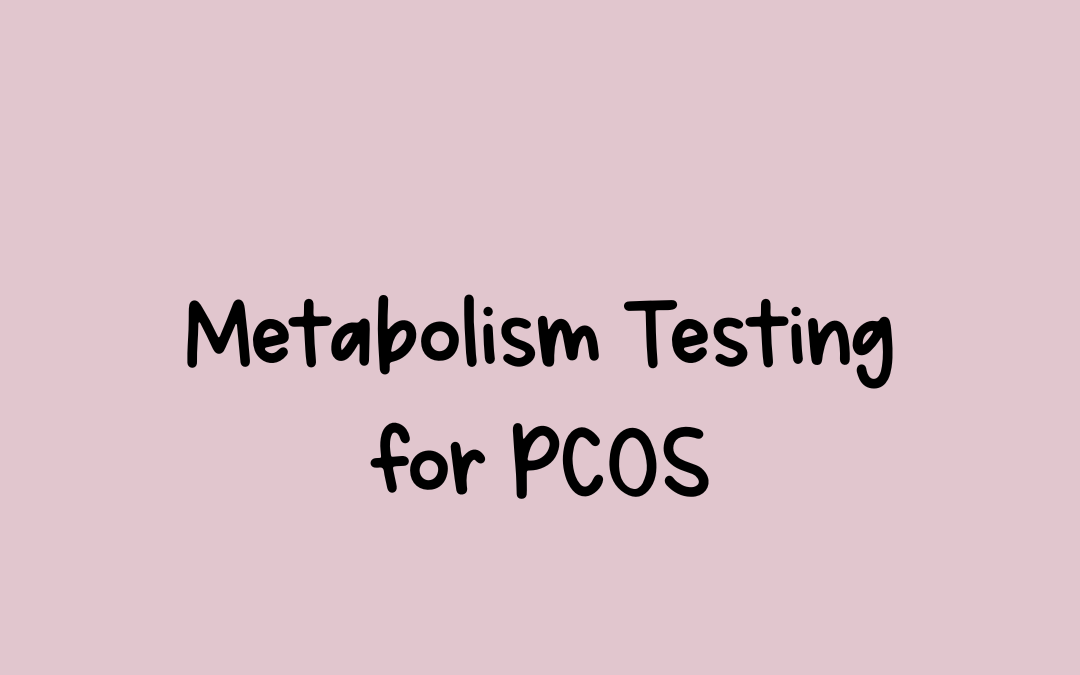
by AmyPlano | Jun 8, 2023 | PCOS and metabolism, PCOS and Weight Gain, Weight Loss
Do you have PCOS and are unable to lose weight in spite of an intense exercise regime and a disciplined diet? Have you hit a plateau in your weight loss? Would you like to take the “guesswork” out of determining your calories to achieve your goals? Well if you answered “heck yes” to any of the questions about then you may be interested in learning more about metabolism testing for PCOS. Knowing your exact metabolic rate can help alleviate all these problems and more.
What is Metabolism
First things first, before we talk about metabolism testing and PCOS (and why it is so friggin’ important for women with PCOS!) we need to define metabolism. Did you know even when you’re at rest, your body needs energy for all of its “silent” functions, such as breathing, circulating blood, adjusting hormone levels, and growing and repairing cells? The number of calories your body uses to carry out these basic functions is known as your resting metabolic rate (RMR).
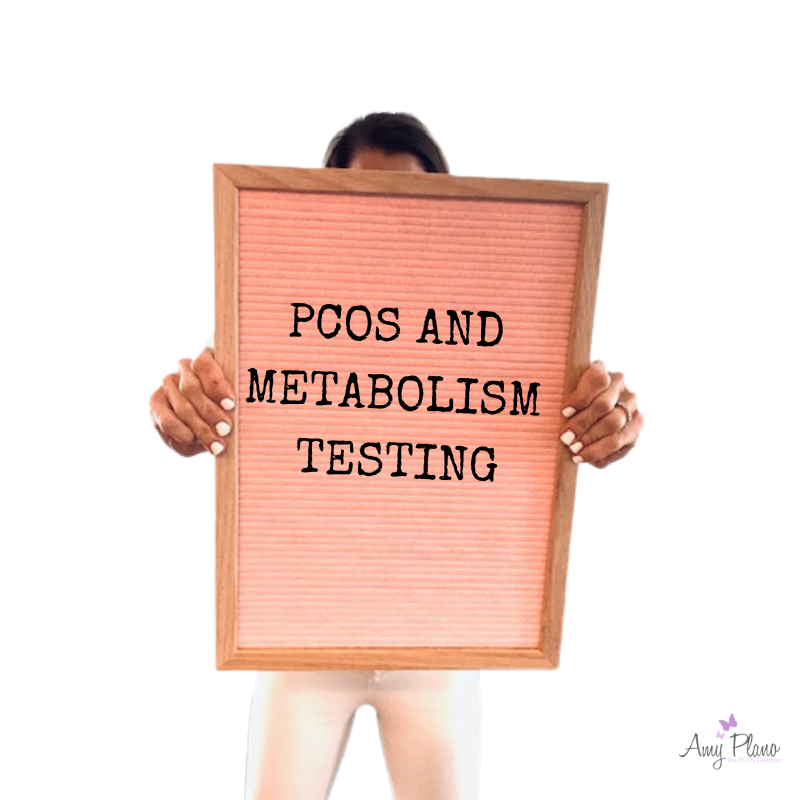
There are many factors that determine our metabolism. They include:
- Your body size and composition. People who are larger or have more muscle burn more calories. Even at rest, these folks tend to have higher RMRs.
- Your sex. Men usually have less body fat and more muscle than women of the same age and weight, which means men burn more calories at rest (Boo!) But don’t worry, I will be sharing some tips for how we chicks can optimize our metabolisms.
- Your age. As you get older (sigh), the amount of muscle you carry tends to decrease. Fat accounts for more of your weight, slowing down calorie burning.
Two other important factors that determine how many calories your body burns each day:
Food processing (we call this thermogenesis!)
Did you know that digesting, absorbing, transporting, and storing the food you consume also burns calories? Score! About 10 percent of the calories your burn each day come from the digestion and absorption of food and nutrients.
Physical activity
Physical activity and exercise— account for the rest of the calories your body burns up each day. Physical activity is by far the most variable of the factors that determine how many calories you burn each day.
So now you know what makes up your metabolism we can finally get down to good stuff!
Below are my top three reasons why metabolism testing for PCOS is so stinking important.
No more guesswork
How many times have you entered your height and weight into an online metabolism calculator only to get some crazy number which you have no idea how to interpret?
I cannot tell you how many times patients come into my office following a calorie level that is completely wrong for the goals they are trying to accomplish. This frustrates the heck out of me. It’s not that they are unsuccessful for lack of trying. It’s simply because they have been provided with the wrong information.
By having your metabolism tested you will now know the exact number of calories your body needs to accomplish your dietary and fitness-related goals. There is no more guessing or even second-guessing where your calories need to be! Through the use of cutting-edge technology, we can help you determine the exact amount of calories you need to reach your goals. Headache solved. Period. End of story.
Provides an accurate baseline
Girl, you have BIG goals which I love and admire. However, how can you accomplish your goals if you don’t know where to start? Conducting metabolism testing for PCOS will allow you to establish a solid baseline. Therefore, as things like your body composition, weight, or performance markers change over time you can adjust your calories relative to your new goals.
Independent of what your specific goals are we all need a caloric starting point. If we don’t have a starting point or baseline and we start making changes to our diet how can we tell what specific calorie level is working? Simply put – we can’t.
Therefore, by having your metabolism tested before making any significant dietary and workout changes you are armed with an accurate, reliable calorie level to base your goals on.
It helps when you are stumped
Knowing your metabolic rate when you have PCOS can be critical when you are stumped. As mentioned previously many women base their goals around a calorie level that is not in tune with their goals.
Trying to gain lean muscle mass but struggling like crazy? It could be that your calories are too low. We all know that in order to build anything we need ‘extra’ resources, right? That extra might be money, resources, or time. The same goes for putting on muscle. In this case, the ‘extra’ needs to be in the form of calories. Therefore, for a woman aiming to put on muscle, they need to FIRST make sure they are taking in enough calories to do.
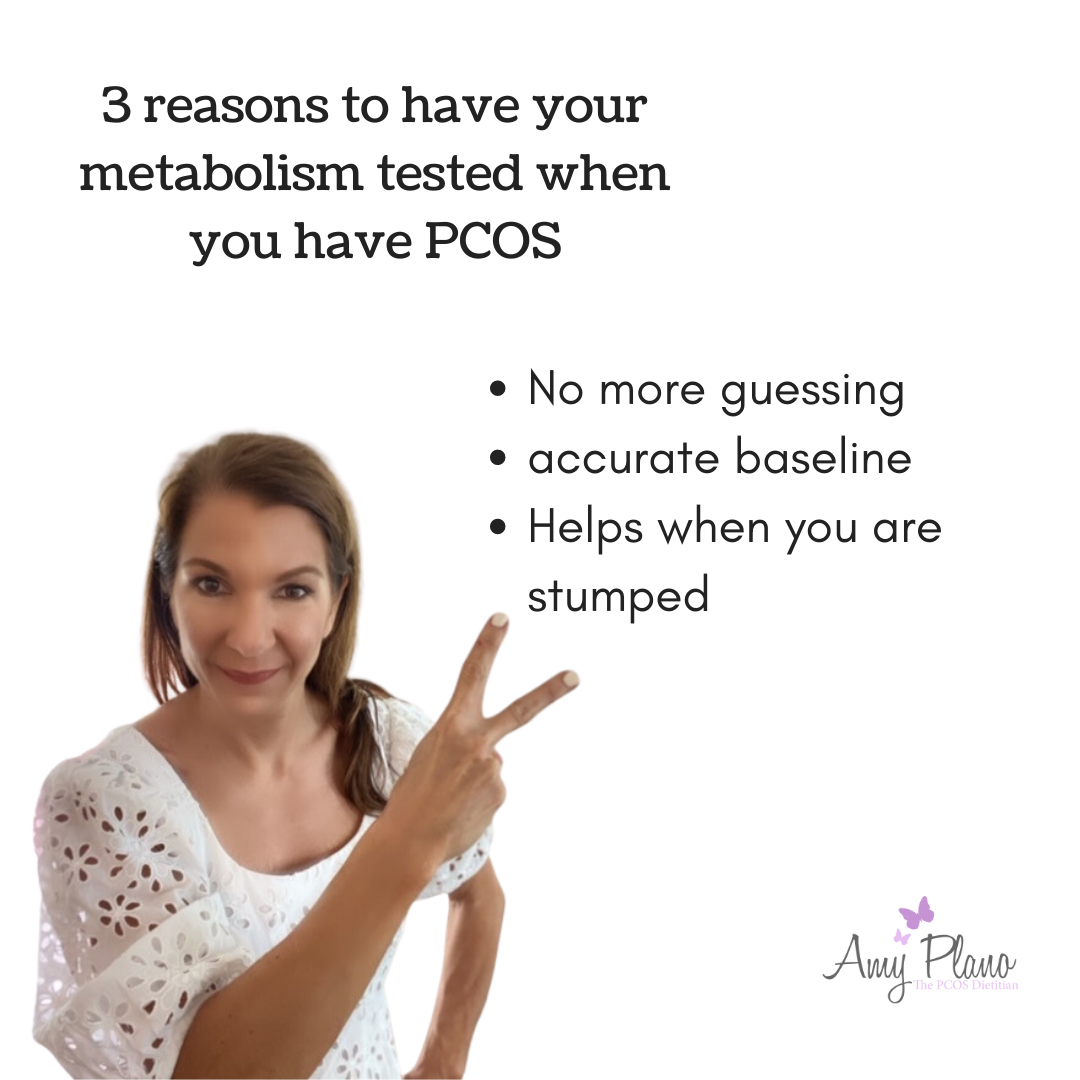
On the flip side, do you feel like you are at a weight loss plateau? Are you meticulously counting calories, carbs, protein, and everything under the sun and still not losing weight? Is MyFitnessPal definitely not your pal? For most people, the simple answer is their calories are not in tune with their weight loss goals. It could be that their calories are too low. Or it could mean that their calories are too high. How the heck will they know the store if they test their metabolism?
Next steps for metabolism testing for PCOS
So those are my top three reasons in support of metabolism testing for PCOS. I hope you found this information helpful. If you want to have your metabolism tested the cost is $150.00 and you would need to come to our Orange, CT office. It is a quick breathing test that takes less than 10 minutes. Plan for about 30 minutes for the entire visit.
Here is more info on how to prepare for the testing.
Shoot me an email at amy.plano@yahoo.com and I would be happy to provide additional deets. I go you, boo!

by AmyPlano | Jun 23, 2019 | PCOS and carbohydrates, PCOS and Weight Gain
Did you know there are over 50 DIFFERENT names for added sugar ? Now, that is KRAZY with a capital K!
And let’s be crystal clear – I am NOT talking about the type that naturally occurs in fruits, veggies, whole-grain products as well as in dairy. We are talking about the sugar that is added to food during processing to enhance flavor, texture and shelf life.
Added sugar is typically composed of the either glucose, fructose and/or sucrose. Unfortunately, many food manufacturers are sneaky and hide the total amount by listing it under several different names on a package’s ingredient list.
As if reading labels wasn’t hard enough to begin with!
Any look familiar?

However, sadly the list does not end here my friends. Check out this quick article from Healthline to learn about the 56 (yes, you read that correctly!) other names that sugar goes by.
Talk about an unsavory alias!
Do any of these surprise you?
Raise your hand if you thought agave was a better choice than white sugar?
Surprised to hear that coconut sugar is a “no-go”?
That leads us to the next important question.
How much added sugar are you allowed per day?
Survey says…
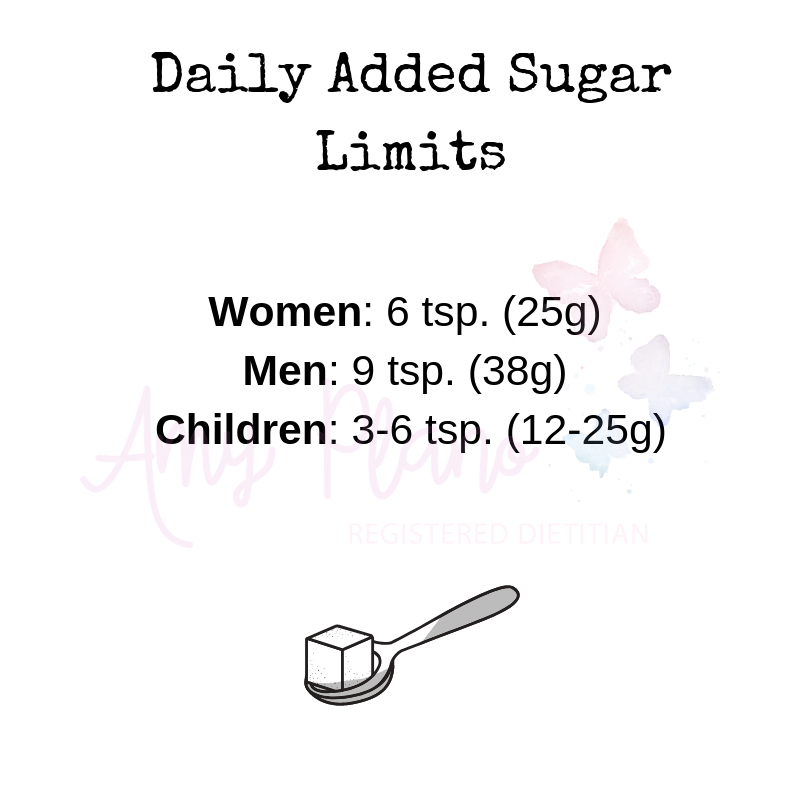
But let’s not sweat the small things. Whole foods like fruits, veggies, whole-grains and dairy products naturally contain small amounts of sugar. However, they are also nutrient powerhouses brimming with fiber, vitamins, minerals and phytonutrients. With these added features, whole foods are processed differently and don’t have the same detrimental effects of added sugars.
Therefore, the most effective way to reduce your added sugar intake is to J.E.R.F. – just eat real food. Plain and simple.
However, if you do decide to buy packaged foods, don’t be a slave to label. Be an informed consumer and stick to your daily quota.
Got questions on added sugars? Hit us up in the comments below. We understand this topic can in fact be tricky and we are happy to help!
Hugs & High Fives,

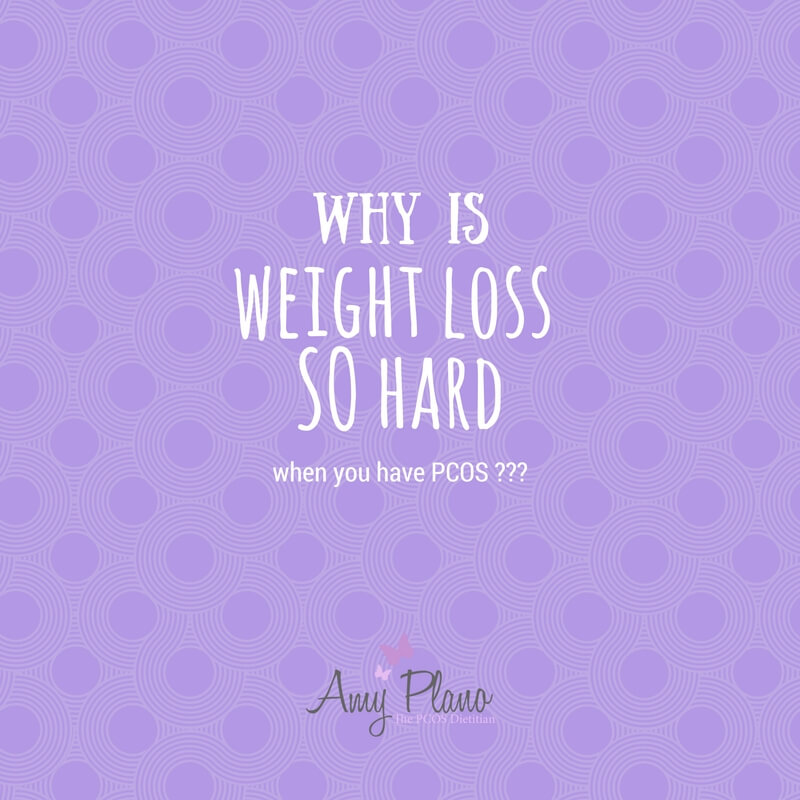
by AmyPlano | Sep 1, 2016 | PCOS and Weight Gain, PCOS Medications, Weight Loss
Why Is Weight Loss SO hard when you have PCOS?
Did you know that weight loss can help with improving almost all the symptoms of PCOS? Even a modest weight loss of 5 – 10 % of a woman’s initial weight can lead to improvements in insulin sensitivity, ovulation and fertility! But, I know this is easier said than done. Weight gain and weight loss are two of the most common issues women with PCOS are forced to deal with.
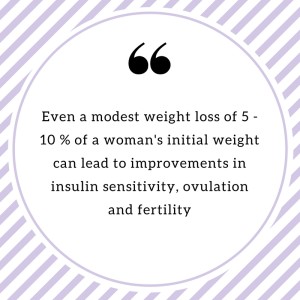
But, what gives ? Why is weight loss so hard if you have PCOS? Well my dietetic intern Jackie Budlowski and I are here to lay the smack down and give the 411 of why the heck it so friggin’ challenging to lose weight when you have PCOS. Get your notebook out — these are some golden nuggets of information 🙂
Insulin
I truly believe insulin is one of the most important hormones in controlling weight! Your pancreas secretes insulin to regulate your blood glucose levels. In most individuals, insulin helps lower one’s blood glucose levels by shuttling glucose into the cells where it can be used for energy. However, most women with PCOS do not effectively process glucose. They experience what is called insulin resistance.Their bodies are less sensitive to the effects of insulin. In response, the pancreas dumps out even more insulin, leading to high insulin levels, or what is known as hyperinsulinemia.
High levels of insulin signal to the body that energy is abundant. In turn, rather than use the extra energy as fuel, women with PCOS store excess glucose as fat. Therefore, one of the biggest keys to controlling weight is to regulate blood sugar and control insulin levels. This is best accomplished through a moderate carbohydrate diet supplemented with the insulin sensitizing agent metformin.
If you are not already familiar with the benefits of metformin please read my previous blog post which will bring you up to speed.
Slow Metabolism
Women with PCOS have been shown to have a slower metabolic rate. This is based on many factors but the primary one being the amount of body fat women with PCOS tend to carry. Your metabolic rate is the number of calories you need for your body and organs to work. You see, body fat is what I consider metabolically “dead.” It does nothing for you but kind of just hang there.
Muscle on the other hand is very thermogenic. It burns more calories than fat does – even while at rest. In fact, muscle tissue is about 8 times more metabolically demanding than fat. A higher percentage of lean body weight (muscles) results in a higher metabolism compared to people of the same weight with a lower percentage.
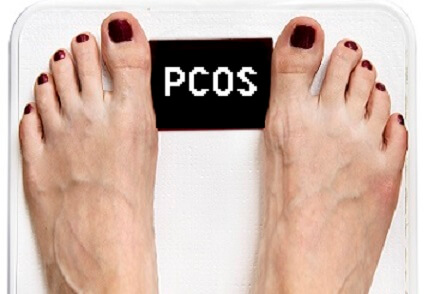
If you have a slower metabolic rate, this means you must consume fewer calories than the average woman. Eating more calories than you burn can lead to weight gain. In future blog posts we will discuss some of the different ways to improve your metabolic rate (Hint – Hint : strength training is definitely one of them!)
If you are curious what your metabolic rate is and you live in the Connecticut area shoot us an email at amy.plano@yahoo.com. We can set up a time to test your metabolism. We have a device called the Bodygem which tests your metabolism by using a simple breathing device. The Bodygem is the “gold standard” of metabolism testing devices. Don’t believe us ? Click here bodygem validation to review the research. The cost of the test is $150.00. You must be fasted, with no caffeine or exercise for 4 hours before the test.
Appetite Hormones
There are a number of hormones involved with hunger and appetite control. Ones of particular interest for women with PCOS are leptin, cholecystokinin (CCK) and insulin. These hormones are responsible for signaling to the body to tell it that is it full and to “stop eating.” Research has shown that women with PCOS have altered hormone signals, which may lead you to feel constantly hungry even when you are consuming enough calories. This leads to overeating, increases in body fat and overall lower esteem. Not a winning combination for weight loss.
Leptin
Did you know that your fat cells produce hormones? This is one reason women who carry a significant amount of body fat often have hormonal problems. One of the hormones produced by your fat cells is leptin. This hormone sends a signal to the hypothalamus gland in your brain when fat cells are full. Due to the fact that cells produce leptin in proportion to their size, overweight women with PCOS also have very high levels of leptin.
Given the way leptin is supposed to work, women who are overweight and have PCOS should have a diminished appetite. But we know this is not the case. You can have a lot of fat making a lot of leptin, but it doesn’t turn the hunger valve off. The brain isn’t listening. No drop in appetite. In fact, your brain might even think you’re starving. This because as far as it’s concerned, there’s not enough leptin! So you get even hungrier. This condition is known as leptin resistance. This causes an up regulation of appetite. This supports why women with PCOS tend to constantly be hungry despite taking in an ideal amount of calories.
Cholecystokinin (Alias: CCK)
Therefore, it may come at no surprise that women with PCOS often feel less satisfied after a meal than women without PCOS. This can be attributed to the hormone cholecystokinin (CCK). CCK is responsible for telling your body you are full after a meal. Women with PCOS are reported to secrete less CCK in response to a meal. So, if your CCK levels are lower, this means you will be hungrier after meals despite just eating. It has also been speculated that impaired CCK secretion may play a role in the greater frequency of binge eating in women with PCOS.
Not so awesome, right ? But the plot thickens …
Insulin
Lastly, insulin also acts as an appetite stimulating hormone. You may already be familiar with the concept of insulin resistance and PCOS. If you are not click here to brush up on your knowledInsulin resistance occurs when there is a lot of insulin being produced (such as, with many women who have PCOS), but the body and brain have stopped “listening” to insulin’s effects. The scenario becomes : you eat, your body releases insulin, but your body still tells you to eat more. So you eat more and increase the likelihood of storing the food you do eat as excess body fat. And if this is not bad enough – you rarely feel satisfied.Therefore, high levels of insulin may be one of the many reasons why you may experience more hunger than other people. Higher hunger levels inevitably leads to more eating which results in weight gain.
Just because it is harder to lose weight, doesn’t mean it is impossible. Here are some tips on how to take the bull-by-the-horns and make your hunger hormones work for you!
Weight loss & PCOS: How to manipulate your hunger hormones for weight loss
Pump up the protein
Do your best to have protein at all meals, but especially at breakfast. Breakfast sets the “appetite tone” for the day! Therefore, consuming high-quality protein sources such as eggs, Greek yogurt or cottage cheese with some nuts will help reduce your hunger hormones and keep your appetite at an even keel throughout the day.
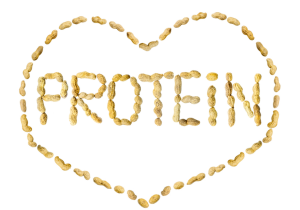
Skip the processed carbs (duh!)
Stay away from refined-carbohydrate-only meals and snacks such as cereal, a bowl of pasta, crackers, chips and starchy snacks. Even having a healthy snack such as fruit alone can trigger a spike and an immediate drop in insulin, so add some nuts, a piece of cheese or Greek yogurt to your fruit.
Focus on high fiber foods
Fiber is deeply tied to satiety. High volume, low-calorie, nutrient dense foods delay gastric emptying keeping food in the stomach for a longer period. Therefore, do your best to include foods such a vegetables, high fiber cereals, fruit and legumes to keep hunger at bay. The goal is aim for 25-30 grams of fiber spread throughout the day.
Eat a diet rich in omega-3 fatty acids to boost leptin
People who are overweight tend to release too much of a group of molecules that the body uses to combat inflammation. These molecules reduce leptin’s ability to communicate with the brain. They are thought to be one of the underlying causes of leptin resistance. Omega-3 fatty acids decrease the production of these molecules by reducing inflammation in the body. The body does not produce omega-3 fatty acid therefore you must get from the diet. Foods high in omega-3 fatty acids include grass-fed meats, walnuts the fattier fish salmon, anchovies, sardines, mackerel, trout as well as chia seeds, flax seeds, summer squash and kale. Aim for about 800 – 1000 mg per day.
Foods high in omega-3 fatty acids include grass-fed meats, walnuts the fattier fish salmon, anchovies, sardines, mackerel, trout as well as chia seeds, flax seeds, summer squash and kale. Aim for about 800 – 1000 mg per day.
While the hormones that effect and control your hunger might be seen as complex, the three I’ve just discussed are keys to to unravelling this complicated web of PCOS, hunger and weight gain. As you can see, there are many factors at play, beyond just your determination to eat properly. These are factors I want you think about when you become frustrated with your PCOS and weight gain.What is important to understand is that your behavior around eating is not always something you can always consciously regulate.
Be confident and believe in yourself. Weight loss may initially be a struggle, but with the proper approach I am confident you can do it!



by AmyPlano | Aug 25, 2016 | PCOS and College, PCOS and Weight Gain
PCOS and College
Do you have PCOS and are heading off to college? Is your head about ready to explode with all the information available on the web regarding nutrition, diet and PCOS? If so, you have come to right spot!
Holy cow, I cannot believe it is that time of year again. Can you? As a seasoned college professor you would think I would be used to this time by now. But every year the end of summer sneaks up on me. Insert sad face emoji. If you have PCOS and are heading off to college you may be experiencing a bit of anxiety regarding how to stick to your diet. Staying on track in college with your diet can be challenging – but certainly not impossible if you have PCOS.
College can be an exciting time! It is the first time you are on your own flexing those “independence muscles.” However, it can also be a very stressful time, full of uncertainty. And as if having PCOS was not bad enough – now you need to navigate an entirely different food domain. But fret not my friend – you are in luck. We have my Yale Dietetic Intern Jacquelyn Budlowski here, to give you some pointers on how to keep on track with your diet and exercise.
PCOS and College: Ten nutrition tips for staying on track with your diet
Write it down to stay on track with your diet

Start a food journal or use an app to track your intake and make sure you stay within your recommended calorie and carbohydrate alotment. Think of it as one of your daily homework assignments! We LOVE the myfitnesspal app as it super user friendly and allows you to track not only your calories – but also your carbohydrate, fat and protein intake. Studies show people who write down what they eat are more successfully at losing weight and keeping it off.
Get your little butt moving
Most college campuses have free gym memberships included with tuition. Many also offer group exercise classes. This can be a fun way to work out and beat the ho-hum of the treadmill. Some colleges even offer recreational sports as a fitness option. This can be a fun way to meet new people, fit in your exercise in and even try a new sport you may have been dying to try. Aim to exercise for at least 120 minutes per week.
Limit your alcohol intake
If you drink alcohol, keep in mind it supplies calories (and often carbs) but no nutritional value. A light beer, a glass of wine, or an ounce of liquor each has about 100 – 140 calories each. The carbohydrate content depends on what the alcohol is mixed with. Plus when your body is metabolizing alcohol – fat breakdown comes to a screeching halt. This can prompt weight gain and reduce your overall metabolism. Plus, alcohol increases your appetite and decreases your mindfulness leading to poor food choices. Did I just hear someone say “Let’s order Chinese ?!?”
Be mindful of “seconds”
It can be tempting to go up for a second plate knowing you have unlimited access to food with your dining card. However, ask yourself if you are really hungry before going up for a second helping. It is possible that you are just overwhelmed by the abundance of food and not really hungry. A good habit is to walk around the cafeteria and check out all the options before deciding what to eat. That way you can make the best balanced choice while getting what you really want in the first place.
Stock up on healthy PCOS friendly snacks
Keep healthy snacks in your dorm room. This way if you are up late studying, you will not be tempted to grab something from the campus store such as candy, chips, or ice cream. Good snack options include cheese sticks, low sugar Greek yogurt, hummus/veggies and even something like a Quest Bar in the event you cannot a balanced meal in.
Don’t Abandon Your Summer Goals
Continue to choose nutrient dense, high fiber options when consuming carbohydrates. Focus your meals mainly around high protein foods and healthy fats such as olive oil, nuts, seeds and avocados (if they have them!) Cafeteria salad bars are a great way to bump up your fiber and pack in your protein. Choose plenty of green leafy veggies and lean sources of protein at the salad bar such as chicken, tuna, chick-peas, hard-boiled eggs and cottage cheese. Your cafeteria may even have a grill station where you could pick up a turkey burger and throw that on top of a salad – yum!

Speak Up Cysta!
Most campus contract food service companies have a list of nutrition values for most of the foods they provide. Ask for the nutrition information or see if you can find it on their website. That way you do not have to guess, “Is this a good choice?” Then, you will be armed with knowledge to select the most PCOS friendly options available to you. No excuses girl friend!
Get your Zzzzz’s
Not getting enough sleep can put a serious damper on weight loss efforts. Sleep deprivation can affect the hormones that control your hunger as well as increase an individual’s level of insulin resistance. This makes it much harder to lose weight. Also we often don’t always make such great food choices when we are hangry, right? Therefore, try your best to get at least 8 hours of sleep per night.
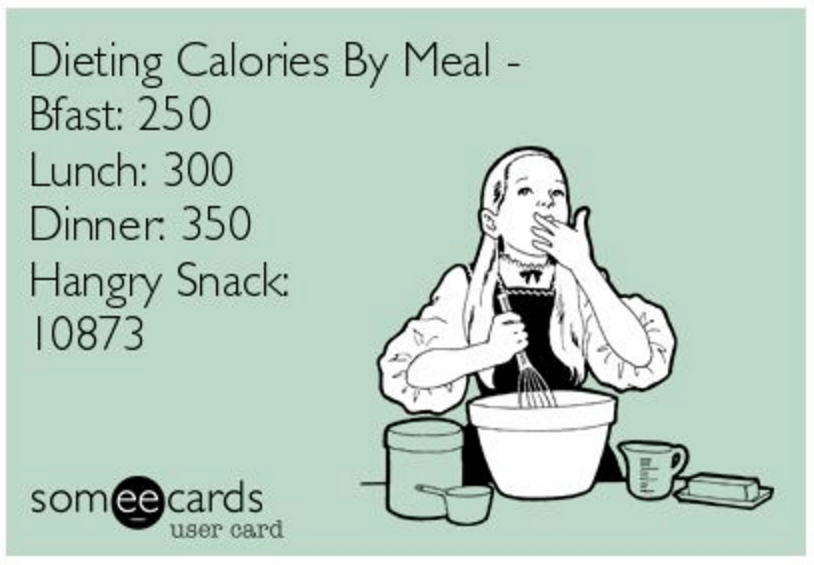
Find your inner Yogi
Balancing classes, exams, friends and extracurricular activities can be overwhelming! It is no surprise that stress can hinder your weight loss goals. Find different ways to relieve stress aside from eating. Many college campuses offer free yoga and/or meditation classes. Even if your school does not offer this opportunity you can find numerous free resources such as podcasts and youtube videos online to help decrease stress. It is amazing what you can get for free when you look!

Don’t be afraid to ask for help
Most schools have health centers that have wellness and nutritional trained professionals who are there you help you make the right choices when it comes to eating and exercise. Don’t be afraid to make an appointment and bring them your schedule. Be honest with them. Let them know you have PCOS and that you are struggling with your eating. They should be able to help you lay out a personalized plan of action to keep you on track. Always remember – you are so much stronger than you think!
So, I know we must have missed a couple hints for you college cysters 🙂 But we would LOVE LOVE LOVE to hear your tips for staying on track when you have PCOS and are at college. What are some things that you have tried that have worked? Any epic fails? Please share with us in the comments below.



by AmyPlano | Jul 19, 2016 | PCOS and carbohydrates, PCOS and metabolism, PCOS and Weight Gain, Truth Bomb, Weight Loss
Given the fact I have been successfully helping women with PCOS lose weight for the last decade, it is fair to say I have seen my fair share of diets. However, one thing I can tell is certain Weight Watchers and PCOS don’t mix!

Typically by the time most women find me, they have been struggling for quite some time with their weight. They have tried every diet out there with minimal success. I don’t think there has been one woman who has exited their initial visit with me not having an “ah-ha!” moment. When women leave my office, it’s often with a sigh of relief — like a load has been lifted off their shoulders. What they have been doing for so long has been so wrong — but they have been brainwashed to think that it is SO right. That folks is the true definition of frustration! No bueno!
PCOS and Weight Watchers: Why Weight Watchers is making you fat!
You see, most women with PCOS are SO confused when it comes to diet. And rightfully so! There is so much information out there — low fat, high fat, no gluten, no dairy, no salt, no carbohydrates. I’ve seen every diet out there. But if I were to say there is any one diet I see many PCOSers follow (or followed at some point in their weight loss journey!) is Weight Watchers. If there is anyone diet platform that is just so damn wrong for women with PCOS it is Weight Watchers. Yes, you heard me correcty! If you have PCOS, Weight Watchers is making you fat! Stop the presses — if you are following a Weight Watchers style diet – get the heck off of it now. Weight Watchers and PCOS do not play in the sand box nicely!
Let me tell you why.
Why Weight Watchers doesn’t work for women with PCOS
You see, Weight Watchers is a very high carbohydrate, moderate protein, low fat diet. Most of the programs created by Weight Watchers provide at least 60 % of the total daily calories from carbohydrates. For Pete’s sake — I don’t even feed my professional athletes that many carbohydrates! Most women with PCOS effectively lose weight when their diet is just around 30 – 40 % total calories coming from carbohydrates. For someone following a 1300 calorie diet, 40 % of your calories coming from carbohydrates would be < 140 grams per day. If you were following the same level calories (I know you don’t count calories on Weight Watchers – you count points – but bare with me sister’!) on a Weight Watchers plan would you would be taking in about 200 grams per day. As small as it sounds — these 60 grams of extra carbohydrates ARE NOT working for your waist line – not to mention how it is impacting your fertility and overall health.
Every time we consume carbohydrates of any kind (it doesn’t matter if it is fruit, oatmeal or a sweet potato!) our bodies break down the carbohydrates into glucose. In response to glucose your angry body dumps out the hormone insulin. Insulin is what we consider a storage hormone. This means when insulin is circulating in our blood system – our bodies do not break down body fat for fuel – but instead it goes into fat storage mode.

As many as 70 % of women with PCOS are insulin resistant. This means their bodies’ are resistant to the effects of insulin. Insulin resistance makes it very difficult for their bodies to process carbohydrates. That is why many women with PCOS take the medication Metformin. This miracle drug for women with PCOS makes their cells more sensitive to the effects of insulin. Therefore, Metformin allows them to break down carbohydrates more effectively. I say more effectively because even on a therapeutic dose of Metformin, say around 1500 mg/day, women with PCOS still tend to not thrive on a diet higher than 40 % total calories coming from carbohydrates. I think of PCOS like having a carbohydrate handicap – that even when medicated on Metformin — this handicap does not go away 🙁

Stop the carbohydrate madness – just say heck ‘no’ to Weight Watchers and PCOS
Weight Watchers is the wrong weight loss program for women with PCOS
So back to Weight Watchers and why it could be responsible for making you fat if you have PCOS. On a typical Weight Watchers program you are eating carbohydrates all day. Breakfast — Special K Cereal (Carb) with Skim Milk (Carb) and fruit (Carb) Lunch – Turkey Sandwich (Carb) with pretzels (Carbs) and a yogurt (Carb) Dinner — Chicken, Sweet Potato (Carb) and broccoli. Snacks – Flavored Greek Yogurt (Carb), Apple (Carb), Skinny Cow (Carb). As you can see there is no shortage of carbohydrates. You mine as well be fueling for a marathon!
I want to make it clear – I have nothing against any of these foods. But for women with PCOS this style of eating creates an insulin disaster! All day long your body is getting flooded with carbohydrates that drives your insulin through the roof. Therefore, on a program like Weight Watchers you become a fat-storing machine – completely the opposite of what you want!
I think Weight Watchers is fantastic for many things – one being accountability. Also for many people it clearly works – and I cannot deny that! But I lie to you not – Weight Watchers is NOT the appropriate program for someone with PCOS trying to lose weight. I work with MANY women who actually gain weight while on a Weight Watchers program. If this is you — do not blame yourself. I bet you are spot-on with your points — it is just not the right program for you.
The right weight loss diet for women with PCOS
Women with PCOS need to follow a modest, lower carbohydrate diet to promote and sustain weight loss. That isn’t the same thing as a no-carbohydrate diet or a low-carbohydrate diet (< 20 grams per day). No need to be so drastic. So please don’t get these terms confused. Most women do well when their carbohydrates are between 90 – 140 grams per day.
In future blog posts, I’ll discuss what a typical day looks like at these carbohydrate levels. But in the meantime if you are hanging with the ladies at Weight Watchers and you have PCOS, please promise me you will cut your ties?
I’m only saying this for your own good – I promise.
Got questions on why Weight Watchers could be making you fat if you struggle with PCOS? Please post them in the comments below. I would love to hear your thoughts.

























